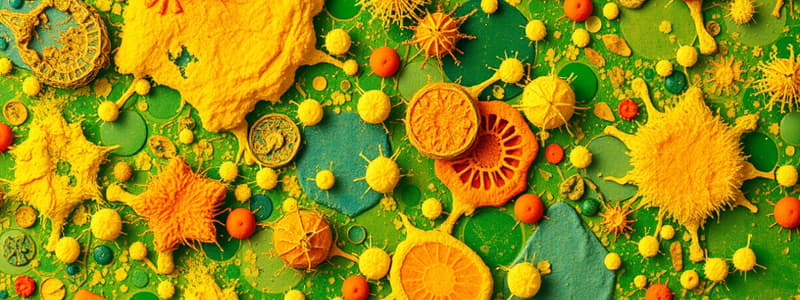Podcast
Questions and Answers
What is starch primarily used for?
What is starch primarily used for?
- Food manufacture
- Construction materials
- Pharmaceuticals
- All of the above (correct)
Which parts of plants are the main sources of starch?
Which parts of plants are the main sources of starch?
- Seeds, roots, and tubers (correct)
- Leaves
- Flowers
- Stems
What are the two general types of starch?
What are the two general types of starch?
Amylose and amylopectin
Modified starches are starches that have been chemically altered.
Modified starches are starches that have been chemically altered.
What process is used to separate purified starch from grains and tubers?
What process is used to separate purified starch from grains and tubers?
Starch is a polysaccharide made up of hundreds or even thousands of __________.
Starch is a polysaccharide made up of hundreds or even thousands of __________.
What causes gelatinization in starch?
What causes gelatinization in starch?
Match the following terms with their definitions:
Match the following terms with their definitions:
Cereal grains are not considered valuable for health.
Cereal grains are not considered valuable for health.
What is one function of starch in processed meats?
What is one function of starch in processed meats?
What are the three most important food crops in the world?
What are the three most important food crops in the world?
A whole grain cereal retains the specific nutrients of the whole, unprocessed grain and contains natural proportions of bran, germ, and __________.
A whole grain cereal retains the specific nutrients of the whole, unprocessed grain and contains natural proportions of bran, germ, and __________.
Flashcards are hidden until you start studying
Study Notes
STARCH
- Starch is the second most abundant organic compound on Earth, primarily found in leafy plants' roots, fruits, and grains.
- It serves as a staple food for many, including rice, corn, cassava, and wheat, providing up to 80% of global calorie intake.
- Starch is widely used across industries including food, cosmetics, pharmaceuticals, textiles, paper, and construction.
SOURCES OF STARCH
- Major plant parts storing starch include seeds, roots, and tubers.
- Common food starch sources include cereal grains (corn, wheat, rice, oats), legumes, and tubers (potato, sweet potato, cassava).
CLASSIFICATION OF STARCH
- Native Starch: Starch as it exists in plants, without alteration.
- Modified Starches: Physically or chemically altered starch to enhance specific properties, like thickening agents in instant desserts and sauces.
- Purified Starch: Extracted from grains and tubers through wet milling, separating starch from fiber, oil, and protein.
STARCH COMPOSITION AND STRUCTURE
- Starch is a polysaccharide composed of numerous glucose molecules.
- It consists of two main fractions: amylose and amylopectin.
THE STARCH GRANULE
- Starch is stored in organized granules within plant seeds and roots.
- Granules contain tightly packed layers of amylose and amylopectin, centered around a hilum.
STARCH PROPERTIES AND REACTIONS
- Gelatinization: Formation of gel-like substances upon cooking.
- Viscosity: Ability to thicken when mixed with water.
- Retrogradation: Occurs in absence of water molecules in starch.
- Syneresis: Water secretion from starch.
- Dextrinization: Color change in starch during heating.
- Hydrolysis: Breakdown of starch into sugars using water.
CEREAL
- Refers to grains used for food, offering nutritional value beyond empty calories.
- Recommended daily intake includes at least four servings of grains.
FUNCTIONAL PROPERTIES OF STARCHES
- Starches function as thickeners in sauces, gravies, and puddings.
- They act as colloidal stabilizers, moisture retainers, gel-forming agents, binders, and flavor carriers.
STARCHES IN PROCESSED FOODS
- Starches are used in processed meats as fillers, binders, and moisture retainers, impacting quality based on their function.
CEREALS
- Cereal grains are significant food crops named after Ceres, the Roman goddess of harvest.
- Essential cereals include rice, wheat, and corn, providing necessary nutrients and viscosity in processed foods.
CEREAL-PROCESSED FOOD
- Whole grain cereals retain nutrients and consist of bran, germ, and endosperm.
- Enriched cereals are rich in vitamins and minerals, offering essential nutrients for health.
Studying That Suits You
Use AI to generate personalized quizzes and flashcards to suit your learning preferences.




